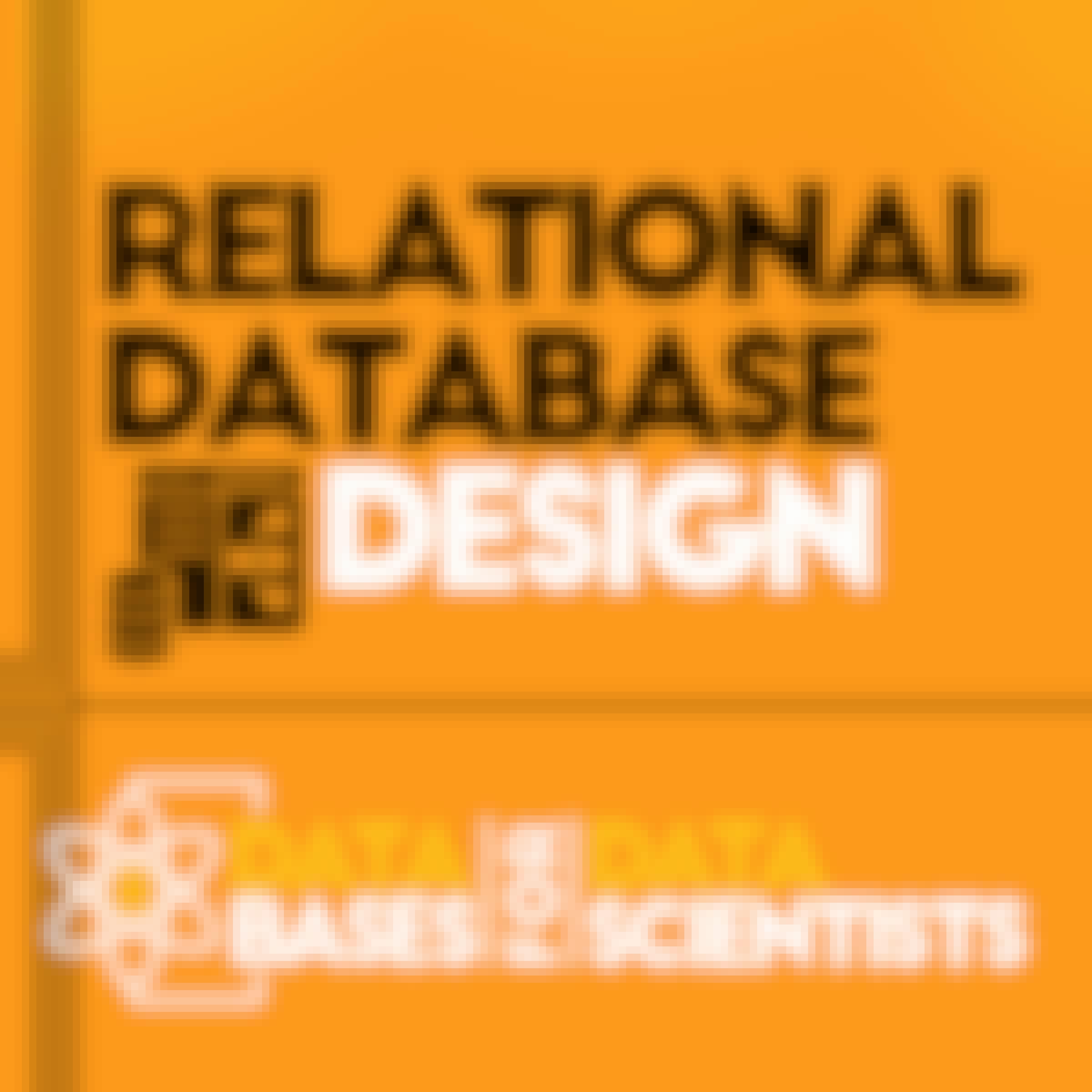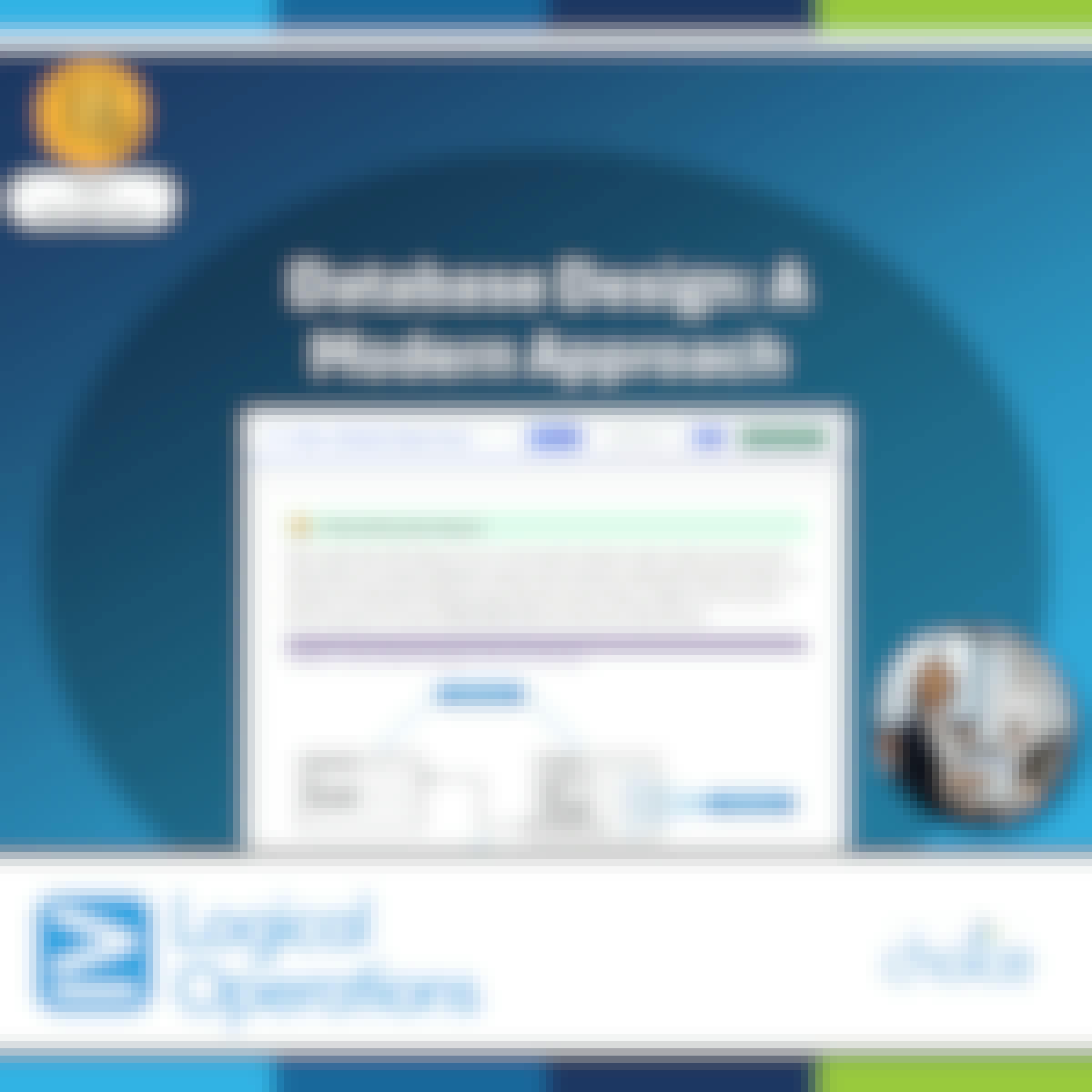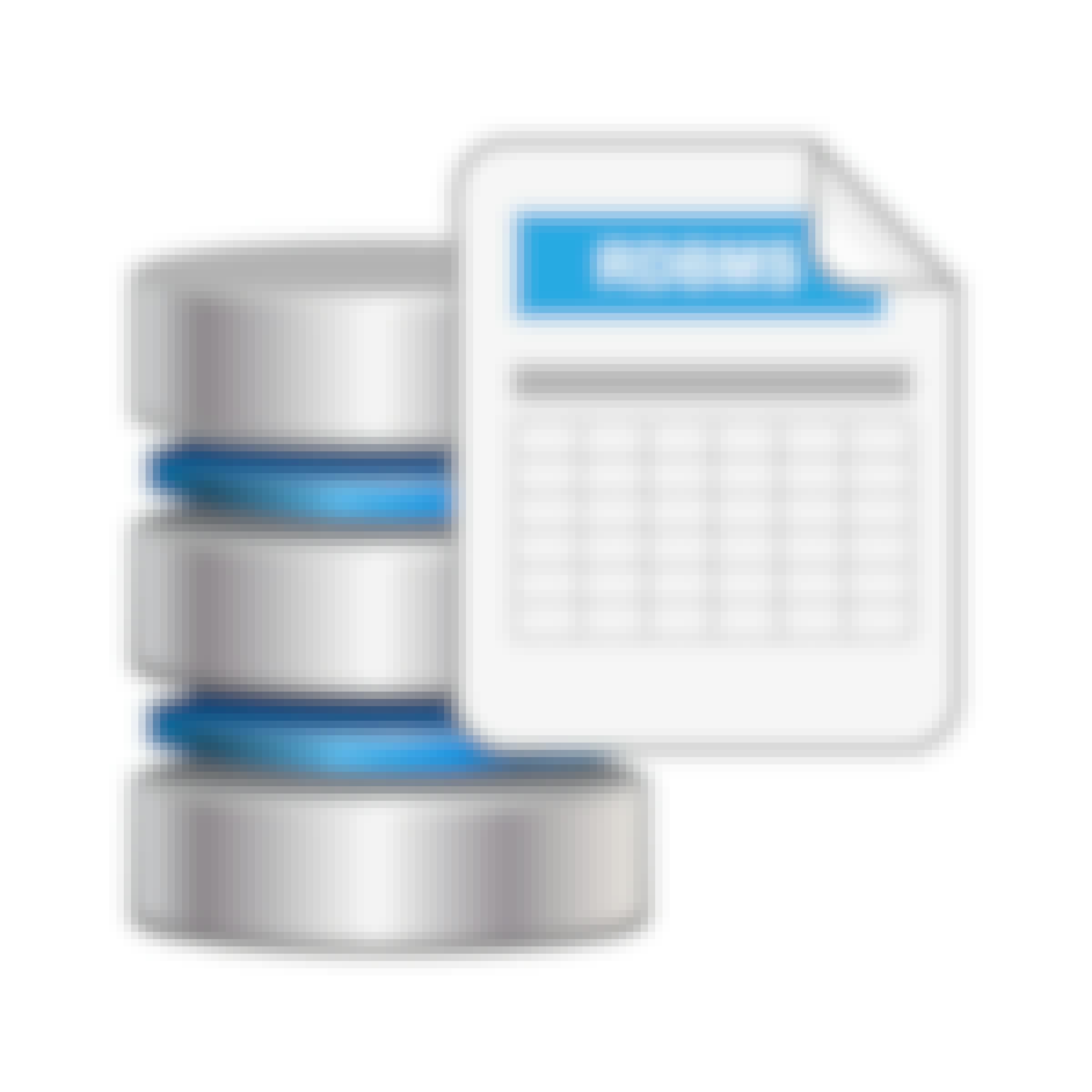- Browse
- Database Design And Development
Results for "database design and development"
 Status: Free TrialFree TrialU
Status: Free TrialFree TrialUUniversity of Colorado Boulder
Skills you'll gain: Database Design, Database Management Systems, Relational Databases, Database Theory, Databases, Database Architecture and Administration, Data Modeling, Data Integrity, Diagram Design
4.6·Rating, 4.6 out of 5 stars340 reviewsBeginner · Course · 1 - 4 Weeks
 Status: NewNewStatus: Free TrialFree Trial
Status: NewNewStatus: Free TrialFree TrialSkills you'll gain: SQL, Database Management, Database Design, Database Architecture and Administration, Query Languages, Databases, Data Manipulation, Performance Tuning, Data Integrity
Beginner · Specialization · 1 - 3 Months
 Status: Free TrialFree TrialU
Status: Free TrialFree TrialUUniversity of Michigan
Skills you'll gain: Database Design, SQL, Relational Databases, PostgreSQL, Database Theory, Database Management, Data Modeling, Databases, Data Integrity
4.8·Rating, 4.8 out of 5 stars1.1K reviewsIntermediate · Course · 1 - 4 Weeks
 Status: PreviewPreviewN
Status: PreviewPreviewNNortheastern University
Skills you'll gain: Database Design, Database Theory, Database Management, Relational Databases, Databases, Database Architecture and Administration, Database Management Systems, SQL, NoSQL, Data Modeling, Unified Modeling Language, Query Languages, Data Integrity, Data Manipulation, Performance Tuning
Build toward a degree
Mixed · Course · 1 - 3 Months
 Status: NewNew
Status: NewNewSkills you'll gain: Microsoft SQL Servers, Database Design, Transaction Processing, Relational Databases, Stored Procedure, SQL, Database Management, Databases, Database Architecture and Administration, Database Management Systems, Data Integrity, Test Data, Data Manipulation, Data Structures
Beginner · Course · 1 - 4 Weeks
 Status: PreviewPreviewN
Status: PreviewPreviewNNortheastern University
Skills you'll gain: Data Governance, Database Management, Database Architecture and Administration, Data Management, Data Warehousing, Database Design, SQL, Transaction Processing, Stored Procedure, Data Security, Disaster Recovery, Encryption, Server Side, Data Encryption Standard, Data Integrity
Build toward a degree
Mixed · Course · 1 - 3 Months
What brings you to Coursera today?
 Status: NewNewStatus: PreviewPreviewL
Status: NewNewStatus: PreviewPreviewLLogical Operations
Skills you'll gain: Database Design, Database Development, Relational Databases, Database Theory, Database Architecture and Administration, Data Integrity, Database Management, Databases, Data Modeling, Cloud Computing Architecture, Data Management, Conceptual Design, Requirements Analysis
Mixed · Course · 1 - 3 Months
 Status: NewNewStatus: Free TrialFree Trial
Status: NewNewStatus: Free TrialFree TrialSkills you'll gain: PostgreSQL, Relational Databases, Database Design, Databases, Database Development, Database Management, SQL, Data Processing, Data Integrity, Query Languages, Data Analysis, Data Manipulation, Data Quality
Beginner · Specialization · 1 - 3 Months
 Status: NewNewStatus: Free TrialFree Trial
Status: NewNewStatus: Free TrialFree TrialSkills you'll gain: Snowflake Schema, Database Design, Star Schema, Database Development, SQL, Database Architecture and Administration, Data Modeling, Technical Documentation
Advanced · Course · 1 - 4 Weeks
 Status: Free TrialFree TrialU
Status: Free TrialFree TrialUUniversity of California, Irvine
Skills you'll gain: Extract, Transform, Load, Decision Support Systems, Data Warehousing, Data Mining, Database Design, Business Intelligence, Dashboard, Star Schema, Relational Databases, Database Management, Data Visualization Software, Snowflake Schema, Data Visualization, Business Reporting, Database Management Systems, SAS (Software), Data Modeling, Interactive Data Visualization, SQL, Descriptive Statistics
4.4·Rating, 4.4 out of 5 stars239 reviewsBeginner · Specialization · 1 - 3 Months
 Status: Free TrialFree Trial
Status: Free TrialFree TrialSkills you'll gain: MySQL, Database Management, Stored Procedure, Database Design, Database Systems, Relational Databases, SQL, Database Development, Database Administration, Query Languages, Data Management, Data Integrity, Data Validation
4.8·Rating, 4.8 out of 5 stars559 reviewsBeginner · Course · 1 - 4 Weeks
 Status: Free TrialFree Trial
Status: Free TrialFree TrialSkills you'll gain: Database Design, IBM DB2, Relational Databases, Databases, Database Management, PostgreSQL, MySQL, SQL, Database Architecture and Administration, Data Manipulation, Data Modeling, Data Import/Export, Data Integrity
4.6·Rating, 4.6 out of 5 stars779 reviewsBeginner · Course · 1 - 4 Weeks
What brings you to Coursera today?
In summary, here are 10 of our most popular database design and development courses
- Relational Database Design: University of Colorado Boulder
- Build & Analyze SQL Databases Through Real Projects: EDUCBA
- Database Design and Basic SQL in PostgreSQL: University of Michigan
- Data Management and Database Design Part 1: Northeastern University
- Design and Implement SQL Server Databases: EDUCBA
- Data Management and Database Design Part 2: Northeastern University
- Database Design: A Modern Approach: Logical Operations
- Apply PostgreSQL for Data Analysis and Database Design: EDUCBA
- Design & Optimize SQL Database Schemas: Coursera
- Database Design and Operational Business Intelligence: University of California, Irvine
Frequently Asked Questions about Database Design And Development
Database design and development refers to the process of creating and managing structured collections of data, also known as databases. It involves defining the structure of the database, organizing and storing data efficiently, and implementing relational models to ensure data integrity and consistency.
In database design, various elements such as tables, attributes, and relationships between different entities are identified. The goal is to create a well-organized and efficient database schema that can accurately represent the data requirements of an organization or application.
Once the database design is established, the development phase involves implementing the design using database management systems (DBMS) like MySQL, Oracle, or Microsoft SQL Server. This includes creating tables, defining relationships between tables, setting up indexes, and implementing security measures.
Database design and development are essential for businesses and organizations that handle large amounts of data. It enables efficient data storage, retrieval, and manipulation, supporting various applications such as customer relationship management (CRM), inventory management, and e-commerce platforms.
Professionals skilled in database design and development are in high demand in the IT industry. They are responsible for ensuring that databases are designed optimally, perform efficiently, and meet the needs of the users.
To become proficient in Database Design & Development, there are several skills you should focus on:
Structured Query Language (SQL): SQL is the fundamental language used to communicate with and manipulate databases. Understanding SQL syntax, commands, and functions is essential for designing and developing databases.
Relational Database Management Systems (RDBMS): Familiarize yourself with popular RDBMS such as MySQL, Oracle, or PostgreSQL. Learn how to install, configure, and interact with these systems.
Data Modeling: Master the art of designing logical and physical data models. This skill involves identifying entities, defining relationships, and normalizing data to create efficient and scalable databases.
Database Optimization: Optimize database performance by understanding indexing, query optimization techniques, and normalization/de-normalization trade-offs.
Security: Learn how to implement robust security measures to safeguard sensitive data, including user authentication, authorization, and encryption methodologies.
Backup and Recovery: Develop skills in creating backup strategies, performing regular data backups, and understanding recovery techniques to minimize data loss and downtime.
Data Warehousing: Gain knowledge of data warehousing concepts, including data extraction, transformation, and loading (ETL), as well as designing and developing data marts and data warehouses.
NoSQL Databases: Familiarize yourself with non-relational databases like MongoDB or Cassandra. These databases are becoming more popular due to their flexibility and scalability.
Data Integration: Understand and work with tools and technologies for integrating databases, such as Extract, Transform, Load (ETL) tools or Data Integration Platforms.
- Industry-specific Knowledge: Depending on the industry you wish to work in, it's beneficial to gain domain-specific knowledge. This may include understanding healthcare data structures, e-commerce databases, or financial systems.
Remember, database design and development is an ever-evolving field, so continuous learning and staying up-to-date with the latest trends and technologies is vital for success.
With Database Design & Development skills, you can pursue various job opportunities. Some common roles include:
Database Administrator: As a database administrator, you will be responsible for optimizing, installing, and maintaining databases. Your tasks may include security management, database backups, and performance tuning.
Data Architect: Data architects design and create data management systems. They develop conceptual and logical data models, ensure data integration across platforms, and define data storage and retrieval strategies.
Database Developer: Database developers write complex queries, develop and implement database solutions, and troubleshoot performance issues. They work closely with application developers to ensure seamless integration with the database.
Data Analyst: Data analysts use their database skills to extract, analyze, and interpret data for making informed business decisions. They identify trends and patterns, create reports, and contribute to data-driven strategies.
Data Engineer: Data engineers focus on designing and building robust data pipelines. They maintain, test, and optimize data architectures, perform data integration tasks, and ensure data quality and consistency.
Business Intelligence (BI) Developer: BI developers design and develop reports, dashboards, and data visualizations to facilitate data analysis and decision-making. They understand business requirements and translate them into actionable insights.
ETL Developer: Extract, Transform, Load (ETL) developers design and maintain ETL processes to integrate data from various sources into a unified database. They ensure data integrity, optimize performance, and troubleshoot data discrepancies.
- Database Consultant: As a database consultant, you can provide expert guidance and support to organizations in optimizing their database infrastructure. You may assist with performance tuning, database migration, or designing scalable database architectures.
It's important to remember that the specific job titles and requirements may vary across companies and industries. Having Database Design & Development skills opens up opportunities in sectors such as technology, finance, healthcare, e-commerce, and more.
People who are detail-oriented, analytical, and have a strong problem-solving mindset are best suited for studying Database Design & Development. This field requires individuals who can understand complex data structures, identify patterns, and design efficient databases. Additionally, having a logical and organized approach to work is crucial in this field. Good communication skills are also important as database designers often collaborate with other stakeholders to understand their requirements and translate them into effective database solutions.
There are several topics that you can study related to Database Design & Development. Here are a few suggestions:
Database Management Systems: Learn about the different types of database management systems, their features, and how to design, create and manage databases using popular systems like MySQL, Oracle, or Microsoft SQL Server.
Data Modeling: Understand the principles of data modeling and learn how to design efficient and scalable database structures. Topics may include entity-relationship modeling, normalization, and database schema design.
SQL (Structured Query Language): Master the fundamentals of SQL, the standard language used for interacting with relational databases. Learn how to write queries to retrieve, manipulate, and analyze data from databases.
Query Optimization: Explore techniques to improve the performance of database queries, such as indexing, query tuning, and optimization strategies.
Database Security: Gain expertise in securing databases and protecting sensitive data from unauthorized access. Learn about authentication, authorization, encryption, and other security measures.
Big Data and NoSQL: Study the challenges and approaches for managing and processing large amounts of data. Explore non-relational databases like MongoDB or Apache Cassandra to handle unstructured or semi-structured data.
Database Administration: Acquire skills in database administration, including tasks like database installation, backup and recovery, monitoring, and performance tuning.
Data Warehousing: Learn about data warehousing concepts, such as data extraction, transformation, and loading (ETL), and how to design and build a data warehouse for efficient reporting and analysis.
Business Intelligence and Analytics: Understand how databases play a crucial role in business intelligence and data analytics. Explore techniques for gathering, analyzing, and visualizing data to make informed business decisions.
- Cloud Databases: Discover the benefits and challenges of using databases in cloud environments. Learn about cloud-based database services like Amazon RDS, Azure SQL Database, or Google Cloud Spanner.
These topics provide a solid foundation in Database Design & Development, and further exploration in these areas can help you gain a comprehensive understanding of this field.
Online Database Design & Development courses offer a convenient and flexible way to enhance your knowledge or learn new Database design and development refers to the process of creating and managing structured collections of data, also known as databases. It involves defining the structure of the database, organizing and storing data efficiently, and implementing relational models to ensure data integrity and consistency.
In database design, various elements such as tables, attributes, and relationships between different entities are identified. The goal is to create a well-organized and efficient database schema that can accurately represent the data requirements of an organization or application.
Once the database design is established, the development phase involves implementing the design using database management systems (DBMS) like MySQL, Oracle, or Microsoft SQL Server. This includes creating tables, defining relationships between tables, setting up indexes, and implementing security measures.
Database design and development are essential for businesses and organizations that handle large amounts of data. It enables efficient data storage, retrieval, and manipulation, supporting various applications such as customer relationship management (CRM), inventory management, and e-commerce platforms.
Professionals skilled in database design and development are in high demand in the IT industry. They are responsible for ensuring that databases are designed optimally, perform efficiently, and meet the needs of the users. skills. Choose from a wide range of Database Design & Development courses offered by top universities and industry leaders tailored to various skill levels.
When looking to enhance your workforce's skills in Database Design & Development, it's crucial to select a course that aligns with their current abilities and learning objectives. Our Skills Dashboard is an invaluable tool for identifying skill gaps and choosing the most appropriate course for effective upskilling. For a comprehensive understanding of how our courses can benefit your employees, explore the enterprise solutions we offer. Discover more about our tailored programs at Coursera for Business here.










